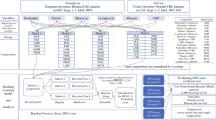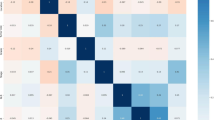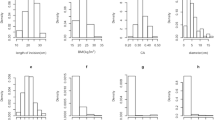Abstract
Background
Postoperative complications in patients of rectal cancer pose challenges to postoperative recovery. Accurately predicting these complications is crucial for developing effective treatment plans for patients.
Methods
In this retrospective study, 493 patients with rectal cancer who underwent radical resection between January 2020 and December 2021 were examined. We evaluated logistic regression, support vector machines, regression trees, and random forests to predict the incidence of postoperative complications in patients and evaluate the performance of the model. The results will be analyzed to make recommendations for reducing complications.
Results
Among the four machine learning models, random forest demonstrated the highest results. The performance of this model was showed with an AUC of 0.880 (95% CI 0.807–0.949), an accuracy of 88.0% (95% CI 0.815–0.929), a sensitivity of 96.6%, and a specificity of 45.8%. Notably, factors such as inflammation related prognostic index, prognostic nutritional index, tumor location, and T stage were found to significantly increase the probability of postoperative complications.
Conclusion
Our study provided evidence that machine learning models can effectively evaluate early postoperative complications of the patients after surgery.





Similar content being viewed by others
Data availability
The data set used to conduct this research will be made available on request.
References
Sung H, Ferlay J, Siegel RL, Laversanne M, Soerjomataram I, Jemal A, Bray F (2021) Global cancer statistics 2020: GLOBOCAN estimates of incidence and mortality worldwide for 36 cancers in 185 countries. CA-Cancer J Clin 71(3):209–249. https://doi.org/10.3322/caac.21660
Benson AB, Venook AP, Al-Hawary MM, Arain MA, Chen YJ, Ciombor KK, Cohen S, Cooper HS, Deming D, Garrido-Laguna I, Grem JL, Gunn A, Hoffe S, Hubbard J, Hunt S, Kirilcuk N, Krishnamurthi S, Messersmith WA, Meyerhardt J, Miller ED, Mulcahy MF, Nurkin S, Overman MJ, Parikh A, Patel H, Pedersen K, Saltz L, Schneider C, Shibata D, Skibber JM, Sofocleous CT, Stoffel EM, Stotsky-Himelfarb E, Willett CG, Johnson-Chilla A, Gurski LA (2020) NCCN guidelines insights: rectal cancer, version 6.2020. J Natl Compr Canc Ne 18(7):806–815. https://doi.org/10.6004/jnccn.2020.0032
van der Sijp MP, Bastiaannet E, Mesker WE, van der Geest LG, Breugom AJ, Steup WH, Marinelli AW, Tseng LN, Tollenaar RA, van de Velde CJ, Dekker JW (2016) Differences between colon and rectal cancer in complications, short-term survival and recurrences. Int J Colorectal Dis 31(10):1683–1691. https://doi.org/10.1007/s00384-016-2633-3
Degiuli M, Elmore U, De Luca R, De Nardi P, Tomatis M, Biondi A, Persiani R, Solaini L, Rizzo G, Soriero D, Cianflocca D, Milone M, Turri G, Rega D, Delrio P, Pedrazzani C, De Palma GD, Borghi F, Scabini S, Coco C, Cavaliere D, Simone M, Rosati R, Reddavid R (2022) Risk factors for anastomotic leakage after anterior resection for rectal cancer (RALAR study): a nationwide retrospective study of the Italian Society of Surgical Oncology Colorectal Cancer Network Collaborative Group. Colorectal Dis 24(3):264–276. https://doi.org/10.1111/codi.15997
Zhou S, Zhou H, Zheng Z, Liang J, Zhou Z, Wang X (2019) Predictive risk factors for anastomotic leakage after anterior resection of rectal cancer in elderly patients over 80 years old: an analysis of 288 consecutive patients. World J Surg Oncol 17(1):112. https://doi.org/10.1186/s12957-019-1655-z
Makuuchi R, Irino T, Tanizawa Y, Bando E, Kawamura T, Terashima M (2019) Esophagojejunal anastomotic leakage following gastrectomy for gastric cancer. Surg Today 49(3):187–196. https://doi.org/10.1007/s00595-018-1726-8
Han WH, Oh YJ, Eom BW, Yoon HM, Kim YW, Ryu KW (2020) Prognostic impact of infectious complications after curative gastric cancer surgery. EJSO-Eur J Surg Onc 46(7):1233–1238. https://doi.org/10.1016/j.ejso.2020.04.032
Dolan RD, McMillan DC (2020) The prevalence of cancer associated systemic inflammation: implications of prognostic studies using the Glasgow Prognostic Score. Crit Rev Oncol Hemat 150:102962. https://doi.org/10.1016/j.critrevonc.2020.102962
McSorley ST, Black DH, Horgan PG, McMillan DC (2018) The relationship between tumour stage, systemic inflammation, body composition and survival in patients with colorectal cancer. Clin Nutr 37(4):1279–1285. https://doi.org/10.1016/j.clnu.2017.05.017
Larson DW, Abd EAM, Perry W, D’Angelo AL, Behm KT, Mathis KL, Grass F (2020) Additional value of preoperative albumin for surgical risk stratification among colorectal cancer patients. Ann Nutr Metab 76(6):422–430. https://doi.org/10.1159/000514058
Yamamoto T, Kawada K, Obama K (2021) Inflammation-related biomarkers for the prediction of prognosis in colorectal cancer patients. Int J Mol Sci 22(15):8002. https://doi.org/10.3390/ijms22158002
Wang PY, Chen XK, Liu Q, Xu L, Zhang RX, Liu XB, Li Y (2021) Application of four nutritional risk indexes in perioperative management for esophageal cancer patients. J Cancer Res Clin 147(10):3099–3111. https://doi.org/10.1007/s00432-021-03585-8
Wang F, He W, Jiang C, Guo G, Ke B, Dai Q, Long J, Xia L (2018) Prognostic value of inflammation-based scores in patients receiving radical resection for colorectal cancer. BMC Cancer 18(1):1102. https://doi.org/10.1186/s12885-018-4842-3
Kuhle S, Maguire B, Zhang H, Hamilton D, Allen AC, Joseph KS, Allen VM (2018) Comparison of logistic regression with machine learning methods for the prediction of fetal growth abnormalities: a retrospective cohort study. BMC Pregnancy Childb 18(1):333. https://doi.org/10.1186/s12884-018-1971-2
Huang MJ, Ye L, Yu KX, Liu J, Li K, Wang XD, Li JP (2023) Development of prediction model of low anterior resection syndrome for colorectal cancer patients after surgery based on machine-learning technique. Cancer Med-US 12(2):1501–1519. https://doi.org/10.1002/cam4.5041
Baker SE, Monlezun DJ, Ambroze WJ, Margolin DA (2022) Anastomotic leak is increased with clostridium difficile infection after colectomy: machine learning-augmented propensity score modified analysis of 46 735 patients. Am Surgeon 88(1):74–82. https://doi.org/10.1177/0003134820973720
van der Pas MH, Haglind E, Cuesta MA, Furst A, Lacy AM, Hop WC, Bonjer HJ (2013) Laparoscopic versus open surgery for rectal cancer (COLOR II): short-term outcomes of a randomised, phase 3 trial. Lancet Oncol 14(3):210–218. https://doi.org/10.1016/S1470-2045(13)70016-0
Dindo D, Demartines N, Clavien PA (2004) Classification of surgical complications: a new proposal with evaluation in a cohort of 6336 patients and results of a survey. Ann Surg 240(2):205–213. https://doi.org/10.1097/01.sla.0000133083.54934.ae
Stoltzfus JC (2011) Logistic regression: a brief primer. Acad Emerg Med 18(10):1099–1104. https://doi.org/10.1111/j.1553-2712.2011.01185.x
Rosa S, Csordas BG, Do VLDO, Santos A, Paniago A, Venturini J (2020) Prediction of conserved peptides of Paracoccidioides for interferon-gamma release assay: the first step in the development of a lab-based approach for immunological assessment during antifungal therapy. J Fungi 6(4):379. https://doi.org/10.3390/jof6040379
de Klaver W, Wisse P, van Wifferen F, Bosch L, Jimenez CR, van der Hulst R, Fijneman R, Kuipers EJ, Greuter M, Carvalho B, Spaander M, Dekker E, Coupe V, de Wit M, Meijer GA (2021) Clinical validation of a multitarget fecal immunochemical test for colorectal cancer screening: a diagnostic test accuracy study. Ann Intern Med 174(9):1224–1231. https://doi.org/10.7326/M20-8270
De Muzio F, Fusco R, Cutolo C, Giacobbe G, Bruno F, Palumbo P, Danti G, Grazzini G, Flammia F, Borgheresi A, Agostini A, Grassi F, Giovagnoni A, Miele V, Barile A, Granata V (2023) Post-surgical imaging assessment in rectal cancer: normal findings and complications. J Clin Med 12(4):1489. https://doi.org/10.3390/jcm12041489
Zeng S, Li L, Hu Y, Luo L, Fang Y (2021) Machine learning approaches for the prediction of postoperative complication risk in liver resection patients. BMC Med Inform Decis 21(1):371. https://doi.org/10.1186/s12911-021-01731-3
Li T, Huang J, Lei P, Yang X, Chen Z, Chen P, Zhai J, Guo X, Wei H (2022) A novel nomogram for anastomotic leakage after surgery for rectal cancer: a retrospective study. PeerJ 10:e14437. https://doi.org/10.7717/peerj.14437
Chan J, Diakos CI, Chan D, Engel A, Pavlakis N, Gill A, Clarke SJ (2018) A longitudinal investigation of inflammatory markers in colorectal cancer patients perioperatively demonstrates benefit in serial remeasurement. Ann Surg 267(6):1119–1125. https://doi.org/10.1097/SLA.0000000000002251
Watanabe J, Otani S, Sakamoto T, Arai Y, Hanaki T, Amisaki M, Tokuyasu N, Honjo S, Ikeguchi M (2016) Prognostic indicators based on inflammatory and nutritional factors after pancreaticoduodenectomy for pancreatic cancer. Surg Today 46(11):1258–1267. https://doi.org/10.1007/s00595-016-1308-6
Peng L, Peng C, Yang F, Wang J, Zuo W, Cheng C, Mao Z, Jin Z, Li W (2022) Machine learning approach for the prediction of 30-day mortality in patients with sepsis-associated encephalopathy. BMC Med Res Methodol 22(1):183. https://doi.org/10.1186/s12874-022-01664-z
Asadi S, Roshan S, Kattan MW (2021) Random forest swarm optimization-based for heart diseases diagnosis. J Biomed Inform 115:103690. https://doi.org/10.1016/j.jbi.2021.103690
Gelbard RB, Hensman H, Schobel S, Khatri V, Tracy BM, Dente CJ, Buchman T, Kirk A, Elster E (2019) Random forest modeling can predict infectious complications following trauma laparotomy. J Trauma Acute Care 87(5):1125–1132. https://doi.org/10.1097/TA.0000000000002486
Kazi M, Gori J, Sasi S, Srivastava N, Khan AM, Mukherjee S, Garg V, Singh L, Mundhada R, Patil P, Desouza A, Saklani A (2022) Prognostic nutritional index prior to rectal cancer resection predicts overall survival. Nutr Cancer 74(9):3228–3235. https://doi.org/10.1080/01635581.2022.2072906
Xia LJ, Li W, Zhai JC, Yan CW, Chen JB, Yang H (2020) Significance of neutrophil-to-lymphocyte ratio, platelet-to-lymphocyte ratio, lymphocyte-to-monocyte ratio and prognostic nutritional index for predicting clinical outcomes in T1–2 rectal cancer. BMC Cancer 20(1):208. https://doi.org/10.1186/s12885-020-6698-6
Moyes LH, Leitch EF, McKee RF, Anderson JH, Horgan PG, McMillan DC (2009) Preoperative systemic inflammation predicts postoperative infectious complications in patients undergoing curative resection for colorectal cancer. Brit J Cancer 100(8):1236–1239. https://doi.org/10.1038/sj.bjc.6604997
Gunay S, Caliskan S, Sigirli D (2022) A nomogram based on myocardial damage and novel inflammatory indexes for post-discharge survival rates of COVID-19. Clin Lab 68(3). https://doi.org/10.7754/Clin.Lab.2021.210745
Hong T, Shen D, Chen X, Cai D, Wu X, Hua D (2018) A novel systematic inflammation related index is prognostic in curatively resected non-metastatic colorectal cancer. Am J Surg 216(3):450–457. https://doi.org/10.1016/j.amjsurg.2017.07.021
Lohsiriwat V, Lohsiriwat D, Boonnuch W, Chinswangwatanakul V, Akaraviputh T, Lert-Akayamanee N (2008) Pre-operative hypoalbuminemia is a major risk factor for postoperative complications following rectal cancer surgery. World J Gastroentero 14(8):1248–1251. https://doi.org/10.3748/wjg.14.1248
Jiang Y, Chen H, Kong M, Sun D, Sheng H (2022) Association between circular stapler size and anastomotic leakage after laparoscopic low anterior resection for rectal cancer. J Cancer Res Ther 18(7):1931–1936. https://doi.org/10.4103/jcrt.jcrt_676_22
Jiang X, Ji Z, Lei X, Liu C, Yuan F (2023) Suitable T stage for cryosurgery to spare the anus in patients with low rectal cancer. Cryobiology 111:121–125. https://doi.org/10.1016/j.cryobiol.2023.05.004
Kehlet H (2020) Enhanced postoperative recovery: good from afar, but far from good? Anaesthesia 75(Suppl 1):e54–e61. https://doi.org/10.1111/anae.14860
Fuzhi Y, Dongfang T, Wentao F, Jing W, Yingting W, Nianping M, Wen G, Xiaoyong S (2022) Rapid recovery of postoperative pulmonary function in patients with lung cancer and influencing factors. Front Oncol 12:927108. https://doi.org/10.3389/fonc.2022.927108
Funding
This work was funded by the National Natural Science Foundation of China (Grant No. 81974375).
Author information
Authors and Affiliations
Contributions
Study conception and design: KW and YT. Acquisition of data: KW and YT. Analysis and interpretation of data: KW and FZ. Drafting of manuscript: KW and XG. Critical revision of manuscript: XG and LG.
Corresponding authors
Ethics declarations
Competing interests
The authors declare no competing interests.
Ethics approval and consent to participate
The studies involving human participants were reviewed and approved by the Ethics Committee of the First Affiliated Hospital of Soochow University. All participating patients signed informed consents.
Conflict of interest
The authors declare that the research was conducted in the absence of any commercial or financial relationships that could be construed as a potential conflict of interest.
Additional information
Publisher's Note
Springer Nature remains neutral with regard to jurisdictional claims in published maps and institutional affiliations.
Rights and permissions
Springer Nature or its licensor (e.g. a society or other partner) holds exclusive rights to this article under a publishing agreement with the author(s) or other rightsholder(s); author self-archiving of the accepted manuscript version of this article is solely governed by the terms of such publishing agreement and applicable law.
About this article
Cite this article
Wang, K., Tang, Y., Zhang, F. et al. Combined application of inflammation-related biomarkers to predict postoperative complications of rectal cancer patients: a retrospective study by machine learning analysis. Langenbecks Arch Surg 408, 400 (2023). https://doi.org/10.1007/s00423-023-03127-5
Received:
Accepted:
Published:
DOI: https://doi.org/10.1007/s00423-023-03127-5




